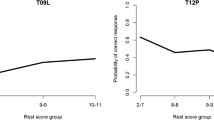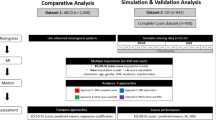Abstract
Incomplete data sets are often encountered in theanalysis of quality-of-life (QOL) data. The incompleteness arisesfrom two major sources, namely, missing responses and artificialquantification of response categories. Shen and Lai (1998a)propose using Optimal Scaling (OS) to tackle the problem. The OSmethod based on numerical iterative approach attempts to restorethe continuous property of the measurements and provide estimatesfor missing responses. However, the OS leads to convergenceproblem when there are many missing values in the data set; andit incorporates no mechanisms to provide the standard errors ofthe mean estimates when missing values are filled. Hot-deckimputation is therefore suggested. This paper presents asimulation study to show that the random hot-deck imputationyields reasonable estimates for the population mean and generallypreserves the distribution of the population. In addition, whenapplying the random hot-deck imputation, valid estimates for thestandard error of the mean estimate can be obtained using thevariance formula due to Lai (1998). With hot-deck imputationtaking care of the missing responses and OS quantifying theresponse categories, it is postulated that the problem of dataincompleteness can be more satisfactorily handled. By applyingthe proposed techniques to real survey data, this paper alsopresents the change of the QOL of Hong Kong residents in the lastdecade leading to the turning point of the metropolis in 1997.
Similar content being viewed by others
REFERENCES
Andrews, F. M. and S. B. Withey: 1976, Social Indicators of Well-Being: Americans' Perceptions of Life Quality (Plenum, New York).
Bailar, B. A., Leroy Bailey and C. Corby: 1978, 'A comparison of some adjustment and weighting procedures for survey data', in Survey Sampling and Measurement (Academic Press, New York), pp. 175-198.
Campbell, A., P. E. Converse and W. L. Rodgers: 1976, The Quality of American Life (Russell Sage Foundation, New York).
Census and Statistics Department: 1995, Hong Kong Monthly Digest of Statistics, June 1998 (Hong Kong Government).
Census and Statistics Department: 1997, Hong Kong Social and Economic Trends, 1997 Edition (Hong Kong Government).
Census and Statistics Department: 1998, Hong Kong Monthly Digest of Statistics, July 1998 (Hong Kong Government).
Coder, J.: 1978, 'Income data collection and processing for the March income supplement to the current population survey', Proceedings of the Data Processing Workshop: Survey of Income and Program Participation, U.S. Department of Health, Education and Welfare, Washington, D.C.
Colledge, M. J., J. H. Johnson, R. Pare and I. G. Sande: 1978, 'Large scale imputation of survey data', American Statistical Association, Proceedings of the Section on Survey Research Methods, pp. 431-435.
Ford, B. L.: 1983, 'An overview of hot-deck procedures', Incomplete Data in Sample Surveys (Academic Press), Part IV Chapter 14, pp. 185-207.
Kruskal, J. B.: 1964, 'Multidimensional scaling by optimizing goodness of fit to a nonmetric hypothesis', Psychometrika 29, pp. 1-27.
Lai, Y. L.: 1998, 'Analysis of incomplete survey data with application to the construction of social indicators of Hong Kong', M.Phil. Thesis, The University of Hong Kong.
Little, R. J. A. and D. B. Rubin: 1987, Statistical Analysis with Missing Data (JohnWiley & Sons).
Rice, R. W.: 1984, 'Organizational work and the overall quality of life', Applied Social Psychology Annual 5, pp. 155-178.
Rubin, D.: 1987, Statistical Analysis of Missing Data (Wiley).
Shen, S. M.: 1996, 'An attempt to build up an index series for the quality of life in Hong Kong', New Frontiers of Social Indicators Research, The Chinese University of Hong Kong, pp. 219-234.
Shen, S. M. and Y. L. Lai: 1997, 'Social well-being during 1988–1995-an index approach', Indicators of Social Development: Hong Kong 1995, The Chinese University of Hong Kong, pp. 3-47.
Shen, S. M. and Y. L. Lai: 1998a, 'Optimally scaled quality-of-life indicators', Social Indicators Research 44, pp. 225-254.
Shen, S. M. and Y. L. Lai: 1998b, 'Social well-being during the transitional period, 1988–1997', Indicators of Social Development: Hong Kong 1997, The Chinese University of Hong Kong, to appear.
Wang, L.: 1994, 'Quality of life in Urban China: A data-based study in the city of Tianjin', Ph.D. Thesis, State University of New York at Albany.
Young, W. F.: 1981, 'Quantitative analysis of qualitative data', Psychometrika 46, pp. 357-388.
Ying, Y. W.: 1992, 'Life satisfaction among San Francisco Chinese-Americans', Social Indicators Research 26, pp. 1-22.
Author information
Authors and Affiliations
Rights and permissions
About this article
Cite this article
Shen, S., Lai, Y. Handling incomplete Quality-of-Life Data. Social Indicators Research 55, 121–166 (2001). https://doi.org/10.1023/A:1011063824077
Issue Date:
DOI: https://doi.org/10.1023/A:1011063824077




